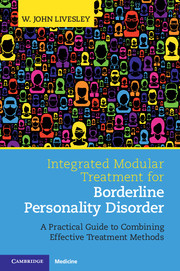 Integrated Modular Treatment for Borderline Personality Disorder
Integrated Modular Treatment for Borderline Personality Disorder Book contents
- Frontmatter
- Dedication
- Contents
- Preface
- Section 1 Introduction and Framework for Understanding Borderline Personality Disorder
- Section 2 Assessment and Treatment Planning
- Section 3 General Treatment Modules
- Section 4 Safety, Containment, and Engagement: The Initial Phase of Treatment
- Introduction
- 13 Managing Crises and Containing Emotions and Suicidality
- 14 Managing the Early Sessions
- Section 5 Improving Emotional Regulation and Modulation
- Section 6 Exploration and Change: Treating Interpersonal Problems
- Section 7 Constructing an Adaptive Sense of Self
- Section 8 Retrospect and Prospect
- References
- Index
14 - Managing the Early Sessions
from Section 4 - Safety, Containment, and Engagement: The Initial Phase of Treatment
Published online by Cambridge University Press: 16 February 2017
- Frontmatter
- Dedication
- Contents
- Preface
- Section 1 Introduction and Framework for Understanding Borderline Personality Disorder
- Section 2 Assessment and Treatment Planning
- Section 3 General Treatment Modules
- Section 4 Safety, Containment, and Engagement: The Initial Phase of Treatment
- Introduction
- 13 Managing Crises and Containing Emotions and Suicidality
- 14 Managing the Early Sessions
- Section 5 Improving Emotional Regulation and Modulation
- Section 6 Exploration and Change: Treating Interpersonal Problems
- Section 7 Constructing an Adaptive Sense of Self
- Section 8 Retrospect and Prospect
- References
- Index
Summary
The early stages of treatment set the stage for the rest of therapy and have a substantial bearing on outcome. Active attention needs to be given to engagement because relationship issues are easily neglected when faced with such urgent problems as intense distress, suicidality, and deliberate self-harm. In the early sessions, engagement is enhanced when the patient sees the therapist as open, realistically optimistic, attentive, sensitively attuned to his/her personal concerns, and flexible in responding to the issues raised.
The First Session
The primary goal for the first session is to ensure that the patient has a positive experience because this session is the template for the rest of therapy and influences the ultimate depth of the therapist–patient relationship and the patient's expectations for treatment. Ideally, the first session should end with the patient feeling a connection with the therapist and that the session was useful. This requires a flexible approach that combines efforts to engage the patient with a focus on immediate concerns and current mental state.
Most patients feel relief about starting therapy although this is often accompanied with anxiety about treatment and even wariness about the therapist. Hence patients need support throughout the session, especially at the beginning. When dealing with any anxiety about treatment, the patient's actual concerns should be discussed rather than just engage in chatting in an attempt to put the patient at ease. Apart from a little small talk at the beginning of a session that is part of normal social politeness, small talk is not helpful and sets a tone that is not conducive to therapeutic work. When patients are anxious about treatment, sufficient time will need to be given to these concerns to ensure that the patient is calmer by the end of the session.
The need to put patients at their ease and build rapport means that the therapist usually needs to be fairly active throughout the session. It is often useful to begin the session with an open-ended enquiry about how things have been since the assessment sessions or about the patient's reactions to what was discussed in those sessions. However, many patients have an agenda and often want to discuss a recent distressing event. This scenario is used to explore and reflect the feelings involved and to attempt to relate them to treatment goals such as self-harming behaviour.
- Type
- Chapter
- Information
- Integrated Modular Treatment for Borderline Personality DisorderA Practical Guide to Combining Effective Treatment Methods, pp. 145 - 160Publisher: Cambridge University PressPrint publication year: 2017


